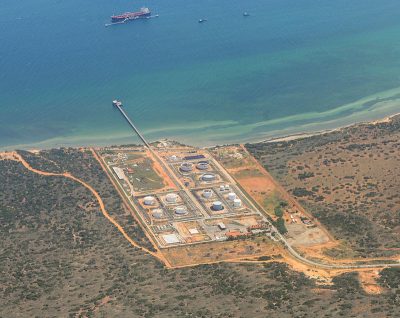New Venezuelan Oil Woes to Head to Court. China’s Petrochemical Conglomerate Sinopec’s Lawsuit against PDVSA

Featured image: PDVSA Gas, Isla de Margarita. (Source: Wikimedia Commons)
The Venezuelan oil industry is currently embattled in two large lawsuits that may have a very serious impact on the future of Venezuelan oil production. The situation for the industry has been precarious since the introduction of the Bolivarian revolution. The state oil company PDVSA seized (for the most part) from its links to powerful corporate interests has been a boon to the Bolivarian project of improving the livelihoods of the average Venezuelan. It has done some tremendous good, including the production of 1.7 million homes for the poor. But, in the past ten years or so, it has taken a battering from the United States in collaboration with the local elites.
Two lawsuits threaten the already fragile situation of the state energy company.
The China Petrochemical Conglomerate Sinopec is suing the Venezuelan state oil company (PDVSA). They allege in court documents filed in a Houston tribunal that they never received full payment for an order of steel products. It was filed by Sinopec’s US subsidiary. They claim that the PDVSA has only paid half the bill which was made in 2012 and worth US$43.5 million. The order provides for 45,000 tons of steel rebar, purchased for PDVSA’s subsidiary Bariven.
China Petrochemical Corporation (Sinopec Group) “is the largest oil and petrochemical products suppliers and the second major oil and gas producer in China, the largest Oil Refinery Company and the second largest chemical company in the world”
Sinopec is specifically alleging fraud. They claim that Bariven was a shell company designed to make the purchase but never deliver the full payment. Sinopec USA described Bariven as an “uncapitalised shell with the sole purpose of preventing Sinopec from having a remedy”. They claim the company was a “sham to perpetrate fraud against Sinopec.” In their claim they allege that the PDVSA “hid behind a complicated series of subsidiaries and affiliates”, and “feigned promises to make full payment”.
There has been no official comment from the Venezuelan state on the matter.
This new lawsuit adds more political pressure to an already untenable situation. As it is, the PDVSA already owes China 10 million barrels of oil that they have not yet delivered. China has already loaned the struggling Latina American country $50 billion USD, much of that in several oil-for-loan deals. The money was to be advanced in exchange for future oil products shipments from PDVSA.
Several Western oil business experts have claimed that this is a significant shakeup between two countries that have remained allies for some time. Some allege that China has lost patience with Venezuela’s economic hardships and large debts. They claim that this new lawsuit may be signalling the beginning of the end of the alliance between the two. This claim is rather extreme and unlikely to play out so dramatically on the world stage. It, however, cannot be considered bad news, and should be taken seriously.
On another front, the country is being taken to the International Court of Justice over a border dispute with Guyana. An area of dispute between the two countries became a great controversy after an ExxonMobil exploration discovered a large deposit of oil. Energy politics being the devil that they are, the two countries began a renewed struggle over who controlled the region.
To make matters worse, ExxonMobil has decided to finance the Guyanese portion of the struggle to the tune of $15 million USD. An amount that is pocket change to an international oil company. The oil giant is hoping to use their name and power to influence any decision on the matter. Of course, if Guyana wins the dispute, ExxonMobil will be the one to profit from the oil deposit.
The Guyanese government claims that the issue is one of national sovereignty. Officials said:
“Our national sovereignty is riding on this issue and it will be remiss of us if we are not prepared and all resources are not put in place. The actual amount is more than US$15M but less than US$20M. This is not the first time we are going this route as it was done with the CGX Energy and Suriname after the June 2000 incident with the Surinamese coastguard. The PPP [People’s Progressive Party] was then in office. This is nothing new. This is not a signing bonus, but rather we are garnering the resources to prepare for the case. This is a sovereignty issue.”
In truth, both sides are fighting for control over a very profitable oil patch that promises to be quite beneficial. There is very little here in the way of territorial sovereignty, this is clearly about money. On the one side you have the Guyanese government and ExxonMobil, and on the other, you have the Venezuelan state.
No doubt ExxonMobil is looking for some revenge against Venezuela for the nationalization of the oil sector. After a long legal battle, Venezuela was ordered to pay them $1.6 billion in compensation for the seizure of assets.
Eventually, that was overturned in 2017. The battle between the two has been a long war of attrition, one that will not be ending anytime soon.
These two lawsuits are serious matters that could greatly impact the PDVSA and harm their reputation internationally. They also come at a time when Venezuelan economy is in terrible shape. The stability of the country is seriously in question and threatens to fracture apart if its overseers fail to plan wisely.

